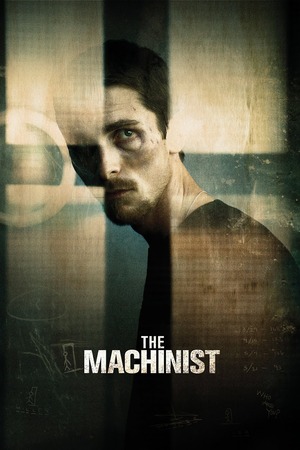
Directed by: Brad Anderson
Starring: Christian Bale, Jennifer Jason Leigh, Aitana Sánchez-Gijón, John Sharian
🕳️ Insomnia as Metaphor for Guilt
Trevor Reznik hasn’t slept in over a year. His skeletal frame, blank stare, and compulsive behavior immediately communicate that something is deeply wrong. But in The Machinist, insomnia isn’t just a medical condition—it is symbolic. Trevor’s inability to sleep reflects his unresolved guilt over a traumatic event he cannot consciously recall.
Insomnia becomes a living manifestation of Trevor’s fractured conscience. The film’s gray tones, perpetual nighttime, and lack of natural lighting mirror the absence of clarity in Trevor’s mind. Without rest, he is also without mental peace—forever drifting in a fog of hallucinations and paranoia. Sleep, here, becomes synonymous with forgiveness, and its absence is a sign that redemption has yet to be earned.
👁️ Hallucinations and the Split Self
Throughout the film, Trevor interacts with a mysterious man named Ivan, who does not appear to exist. Ivan becomes a symbol of the repressed aspects of Trevor’s psyche. The missing fingers, the sunglasses, the sly demeanor—all signal something lurking beneath the surface. Ivan is not a traditional antagonist; he is the personification of Trevor’s buried guilt, the piece of himself he has externalized to avoid facing internal pain.
As Trevor spirals into paranoia, his perception of reality breaks apart. Hallucinations blend with waking life, and clues to his past are encoded within them. The use of mirrored imagery—most notably in the bathroom scene—reinforces this duality. Ivan becomes a surrogate for the conscience Trevor is desperate to suppress, until he finally has no choice but to confront him head-on.
🧩 The Puzzle of Identity
Trevor Reznik is not who he thinks he is. His interactions with the waitress Marie and her son Nicholas are staged constructs, a fantasy he’s manufactured to cope with loss and guilt. The clean kitchen, the mother’s smile, the bright diner—all stand in stark contrast to his real life, filled with industrial gloom and emotional desolation.
These constructed identities act as psychological defense mechanisms. The diner, for instance, is saturated in warm hues and offers a version of life that is ordered and forgiving. This fantasy represents Trevor’s yearning for redemption and a return to moral clarity. But because it is a fiction, it disintegrates under scrutiny. The collapse of this dream signals the final breakdown of his defenses, and the full return of the traumatic truth he’s buried.
📘 Dostoevsky and the Weight of Conscience
The Machinist opens with a visual nod to Dostoevsky’s *The Idiot* and borrows heavily from themes found in *Crime and Punishment*. Like Raskolnikov, Trevor is a man haunted by the crime he refuses to admit. His physical decay is not merely from lack of sleep but the moral rot of a man unable to forgive himself.
This intertextual reference places *The Machinist* firmly within a tradition of existential guilt and punishment. Trevor’s punishment is not imposed by society, but by his own conscience. His descent into madness is not driven by external justice but by an internal reckoning. As with Dostoevsky's characters, the only way out is confession—a return to truth, however painful.
🚦Industrial Landscape as Psychological Prison
The factory in which Trevor works is a cold, metallic labyrinth—mirroring his psychological state. Machines are omnipresent, dangerous, and dehumanizing. This environment externalizes his inner turmoil. The loss of a co-worker’s arm, for which Trevor is partially responsible, becomes another guilt-bearing event layered onto his already fragile psyche.
The factory also serves as a purgatory. He drifts through shifts, misunderstood by his peers, and unanchored from time. His attempts to interact with others always unravel, marked by suspicion and isolation. This mechanical purgatory mirrors the repetitive, grinding nature of guilt—a cycle with no release.
🕯️ Redemption through Truth
Only by confronting the memory of the hit-and-run that killed a child—an event he has suppressed—does Trevor find peace. He turns himself in, symbolically walking into a police station with a serene expression for the first time. This final act, devoid of drama, marks a profound release.
His confession does not bring resolution in the conventional sense; he will face legal consequences. But spiritually, Trevor is reborn. The final scene shows him lying down in a prison cell, finally able to sleep. It is a cathartic moment—sleep becomes the film’s ultimate metaphor for redemption and psychological rest.
🎯 Final Thoughts
The Machinist is not merely a psychological thriller—it is a meditation on guilt, identity, and the high cost of repression. Christian Bale’s extreme physical transformation is not just for visual shock—it is a narrative device, embodying a man hollowed out by denial and desperately seeking peace.
From its grim aesthetic to its literary allusions, the film constructs a claustrophobic exploration of the human conscience. Trevor’s journey is not about solving a mystery—it is about confronting a truth too painful to live with and too heavy to escape. In the end, his story suggests that redemption is possible, but only when we stop running and face ourselves completely.